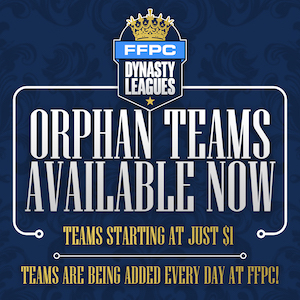Antonio Losada evaluates tight ends for 2022 fantasy football that should be prioritized in Standard leagues while faded in PPR ones, as well as those who should be studs in PPR leagues but duds in Standard based on ADP.
It feels impossible but the NFL offseason can be considered over in terms of high-impact moves only with the first-year draft ahead. The free agency is long gone, most players have extended their deals or found new homes, and teams are ready to start moving the rock come summer training camps.
For us fantasy GMs, the draft season is only gearing up and it will stay that way for the following days and weeks. Preparing for what is waiting for us in our virtual war rooms is a key part of the process, and the first thing to know is the language our leagues will speak to us. Excuse me for being a little poetic. What I mean is, you better know if you're going to battle your foes in Standard or PPR (Point-Per-Reception) scoring systems. The only difference between those leagues comes down to a simple matter of awarding one extra point to players that catch a pass. Standard scoring was a staple in the early days of fantasy football but PPR has become the most played system lately.
With both Standard and PPR-scoring systems in mind, it's time to discover which players are surefire bets in one system but potential duds in the other. Today, I'm highlighting three tight ends who are primed to become studs in Standard leagues but not so much when used in PPR format, and three more that fall on the other side of the equation: studs in PPR leagues and duds in Standard ones.
Featured Promo: Looking for some more fantasy football action? Adopt a dynasty orphan team over at FFPC. Sign up today and get $25 off any FFPC league. Sign Up Now!
PPR Studs, Standard Duds
Mike Gesicki, Miami Dolphins
We're at a point throughout Gesicki's career where it doesn't come as a surprise to find him labeled as a TE/WR hybrid anymore. Since entering the league back in 2018, only six other tight ends have more receptions than Gesicki's 199 while only seven have accrued more receiving yards than the Dolphin (2,255) in that same span. Remove the touchdown points, where Gesicki has been a little bit disappointing with just 13 scores over four seasons, and the rest of his stat line is extraordinary.
That last point, though, is precisely one of the things that hurt him in Standard formats. In leagues that don't award points per reception, you have to maximize the rest of the categories. Thus, Gesicki's flop in those and boost in PPR formats. Even if the targets go down a bit in a much more crowded/talented offense in Miami come 2022, Gesicki will still get his 90+ targets for 60+ receptions no matter what. The touchdowns were down to only two TD last year, which sucks, and that might not really change for the good next season with the likes of Tyreek Hill and a still-improving Jaylen Waddle around. Good for Mike, though, the volume should still be high and so should the receptions, making him a perfect target for those managing in PPR competitions.
Cole Kmet, Chicago Bears
The Bears are locked into handing QB Justin Fields the offense on a full-time basis come September. Fields only started 10 games last year, mostly because of injuries keeping him off the field. Assuming a healthy campaign, he should be there for the full 17-game schedule. That should benefit Kmet, Chicago's no.1 TE and top-three pass-catcher, as I'm writing this (before the draft). The Bears lack weapons all around the receiving corps, and Kmet should be the second option (behind Darnell Mooney) for Fields on every passing play. Alas: the PPR bounties.
While not a staggering fantasy asset in his rookie 2020 year (top-40 TE), Kmet saw a 111% increase in targets from Yr1 to Yr2, getting 93 opportunities last season of which 60 ended in actual receptions. Of course, that's good, but what wasn't great was the zero-TD figure. That, pretty much as in the case of Gesicki (read above), is what kills Kmet's upside in most standard/non-PPR formats. Kmet should post his customary 85/65/750 line next year as a baseline with upside for more, but we'll see if he improves on that scoring front, which isn't a lock to happen. Until Kmet becomes a steady touchdown threat, he's not worth paying top draft capital for in any non-PPR draft.
T.J. Hockenson, Detroit Lions
Hockenson's case is different from those of the two tight ends highlighted above. It's not that T.J. doesn't know how to score touchdowns (he's got 12 in his three seasons as a pro while missing nine games of the 49 he could have played), but rather his inability to put up huge yardage what cuts some of his standard-format upside short. Even though Hockenson has played at least one fewer game than 23 other TEs from his 2019 rookie season on, he's gotten more targets (eighth-most) and more receptions (ninth) than most of them.
The problem, already introduced, is the fact that he has scored below-average TDs and posted below-average Y/R figures too. A quick glance at Hockenson's YPR average of 10.6, combined with his low 12 TD over the years, makes Hock a good option for PPR leagues in which points per catch are at a premium while total yardage and scores aren't that important in comparison. Hockenson has volume and opportunity in his favor even if he underperforms a bit in scoring/yard-eating terms, making him a very fadable player in standard formats but a solid TE in PPR leagues.
Standard Studs, PPR Duds
Dawson Knox, Buffalo Bills
Knox finished last season with 15 games played. He was one of only 33 TEs (pretty much each team's starter) to appear on 500+ snaps over the year, though Knox's 4.7 targets per game and 71 targets overall ranked in the 43rd and 40th percentiles among those in that group. No bueno if you're banking on receptions and PPR points (aka massive volume) over actual production. Good for Knox, though, he's a maven at this thing called squeezing goodies from nowhere.
Knox posted first-quartile numbers in YAC/Target with 3.9 of them. That means he finished eighth on that leaderboard above the likes of Darren Waller, Zach Ertz, or Mark Andrews just to name a few top-end tight ends. In other words: give Knox a few chances, and he'll make the most of them. And that's precisely what this offense in Buffalo is predicated into. Now with Cole Beasley out of the slot--through the Bills have landed Jamison Crowder, mind you--there is a chance Knox gets a few more targets (say, in the 80-to-85 ballpark if he plays the whole 17-game schedule) and has more chances to both 1) putting up more yards than he already does (70th pctl. YPT; 64th pctl. YPR) and 2) keeping up his TD-scoring numbers (nine TD last year, five TDs in the prior two campaigns combined).
Dallas Goedert, Philadelphia Eagles
The Eagles' offense is definitely a little bit confusing and a walking-living-breathing question mark. That said, Goedert was good enough for Philly to retain his role in that O, posting career-highs (or nearly) in some important statistical categories. That is, with Zach Ertz in town for half a season but not anymore. The thing about Goedert is that while he had historically been a good standard player without a ton of PPR upside, he might have turned into a bona fide asset in both formats now. That's because he got average volume (76 targets), above-average receptions (56), and a ridiculous 73.7% catch rate that ranked seventh-highest among TEs with at least 30 targets last season.
Of course, the four TD were far from otherworldly but still counted for something as only 11 other TEs scored 5+ touchdowns over the 2021 season. Goedert is a freak no matter the stat you look at. His numbers are just insanely great. He ranks inside the top-quartile in all of aDOT, Yds/Route, Completed AirYds/Target, YAC/Target, and absolute receiving yards, and he's this close to making it in other leaderboards such as Contested Catch Rate. One of the most fitting player profiles to have rostered in your standard leagues.
Pat Freiermuth, Pittsburgh Steelers
You can clearly say that Patty F hit 'em where they ain't. For starters, Freiermuth debuted with Pittsburgh last year and scored the sixth-most TD by a tight end in the NFL (82nd pctl.). He already got 79 targets and 60 receptions over his 60 games, both marks slightly above average but perhaps not enough to consider him a true TE1 in PPR formats. In standard leagues, though, Pat should be a lock to finish in the top-tier among players eligible at the TE position with upside for a top-six finish if the volume goes a tick up, allowing him to rack up more yards than the slightly disappointing 497 he had last season.
The truth is that the yards just weren't there. That's a knock for those managing in standard leagues, I know, and maybe a concerning one. Betting on Freiermuth is betting on a re-do in terms of TD scoring and ridiculous catch rates (75.9%) in 2022. Those excellent and efficient levels of production might be a little bit scary but remember that we're talking about a second-year player in Patty F, playing under a quarterback that won't be worse than Washed Big Ben was last season, and in an offense barren of reliable pass-catchers, thus possibly getting more chances than anyone on TD-leading throws and overall targets, all of it helping Freiermuth counting stats--the ones that matter for standard-league GMs.
Download Our Free News & Alerts Mobile App
Like what you see? Download our updated fantasy football app for iPhone and Android with 24x7 player news, injury alerts, rankings, starts/sits & more. All free!

More Fantasy Football Analysis





 RADIO
RADIO




























